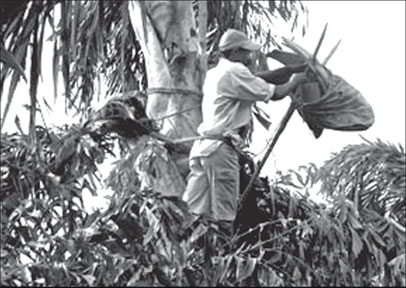|
Shortage of tappers, lack of knowledge hit industry:
Rs.19 m to develop kithul industry
By Lalin Fernandopulle
Around Rs.19 m has been allocated to develop the kithul industry in
Sri Lanka, Traditional Industries and Small Enterprise Development
Ministry Additional Secretary, Susantha de Silva said.
He said an insurance scheme will be launched for those engaged in the
kithul industry which has much potential for development. An insurance
scheme that has been launched for trainers will be extended to others in
the industry.
 Manufacturers of kithul- based products are unable to sell their
product as low quality items flood the market. The scarcity of tappers
is a major issue that needs to be addressed urgently if the age-old
industry is to be salvaged according to industry experts. Manufacturers of kithul- based products are unable to sell their
product as low quality items flood the market. The scarcity of tappers
is a major issue that needs to be addressed urgently if the age-old
industry is to be salvaged according to industry experts.
The kithul industry provides a livelihood to a large number of
people. It is estimated that around 30,000 people depend on the
industry. Kithul treacle, jaggery and toddy are some of the popular
products manufactured using the kithul sap extracted from the
florescence.
Kithul, Caryota urens also known as fish tail palm or toddy palm, is
an indigenous plant which grows in the wild, in forest covers and home
gardens in Sri Lanka.
An age-old cottage industry it has been built through the
generations. Villages have depended on the kithul tree to produce sweet
products from the time of the kings.
"The shortage of tappers and lack of knowledge on manufacturing and
preserving products are major problems affecting the growth of the
industry. Steps have been taken to register industrialists and provide
training on new methods of tapping and preserving kithul products," de
Silva said.
The kithul industry is a village-based traditional industry. The
knowledge has been highly valued and preserved within the family and
handed down from generation to generation. Experts believe that the
kithul industry would die a natural death before long due to the shift
to white-collar jobs with more remuneration and prestige.
Around 580 million litres of kithul sap is extracted a year and the
industry generates an income of several hundred million a year. It is
estimated that the kithul industry supports around 220 industries in the
country.
Experts said that an industry with enormous potential has been
neglected. The industry could support a large number of families and
provide a stable income to many.
De Silva said that a unit was set up last month to develop the kithul
industry. Steps will be taken to conduct more training programs to
impart technical knowledge and enhance the quantity and quality of
products.
"The Ministry with the support of the Industrial Technology Institute
(ITI) and universities have launched programs to introduce more kithul
products and preserve the sap. A low cost cooker to manufacture products
using the sap was introduced with the support of ITI," de Silva said.
ITI has introduced methods to increase the quality and quantity of
sap, identify high yielding varieties and also set up a small, pilot
processing units to produce quality kithul products following a study on
the tapping processes used in villages.
Studies reveal that the quality and quantity of sap were mainly
dependent on the treatment mixture applied to the inflorescence to
induce sap secretion and the tapping method practised. It has also
brought to light many problems faced by those in the industry.
The need for a field test kit to detect adulteration of the sap,
treacle and jaggery with cane sugar was and the formulation of quality
standards for the products for trading in local and export markets were
felt.
Kithul products have a high demand due to its uniqueness in taste,
aroma and traditional claims on health benefits.
However, due to the demand and low production, kithul products are
costly. It has been estimated that a family could earn an income of
Rs.10,000 a month by manufacturing treacle and jaggery.
"We provided safety kits to kithul tappers and launched a plantation
program with the help of the Export Agriculture Department and Forest
Department to distribute plants to growers," de Silva said.
Kithul is grown in the Ratnapura, Kegalle, Matale and Kalutara
districts. It is estimated that there are around 600,000 kithul trees in
the country of which only 150,000 are being tapped.
"Steps will be taken to expand the kithul market with the support of
the private sector. We will launch a unit to detect low quality products
that infiltrate the market and punish those who try to undermine the
industry. The kithul industry will be upgraded from a rural to a
commercial industry under the national kithul development program," de
Silva said.
Plans are also afoot to launch more sales outlets in Colombo and the
suburbs this year. The Ministry operates a sales outlet at the
Janakalakendraya in Battaramulla.
|



